Serving 725 students in grades 7-8, Prescott Junior High School ranks in the bottom 50% of all schools in California for overall test scores (math proficiency is bottom 50%, and reading proficiency is bottom 50%).
The percentage of students achieving proficiency in math is 23% (which is lower than the California state average of 33%). The percentage of students achieving proficiency in reading/language arts is 39% (which is lower than the California state average of 47%).
The student:teacher ratio of 19:1 is lower than the California state level of 21:1.
Minority enrollment is 84% of the student body (majority Hispanic), which is higher than the California state average of 80% (majority Hispanic).
Quick Stats (2025)
- Grades: 7-8
- Enrollment: 725 students
- Student:Teacher Ratio: 19:1
- Minority Enrollment: 84%
- Overall Testing Rank: Bottom 50% in CA
- Math Proficiency: 23% (Btm 50%)
- Reading Proficiency: 39% (Btm 50%)
- Science Proficiency: 26% (Top 50%)
- Source: National Center for Education Statistics (NCES), CA Dept. of Education
School Overview
Prescott Junior High School's student population of 725 students has declined by 5% over five school years.
The teacher population of 38 teachers has grown by 5% over five school years.
Grades Offered
Grades 7-8
Total Students
725 students
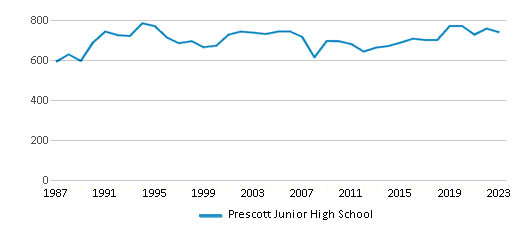
Gender %
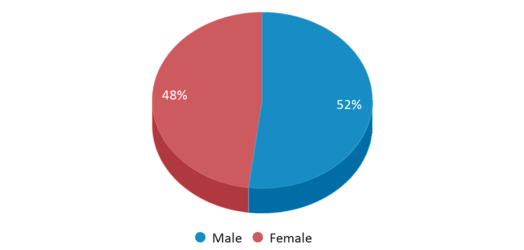
Total Classroom Teachers
38 teachers
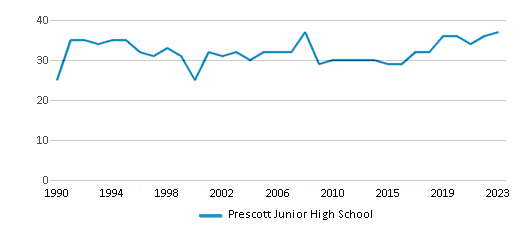
Students by Grade
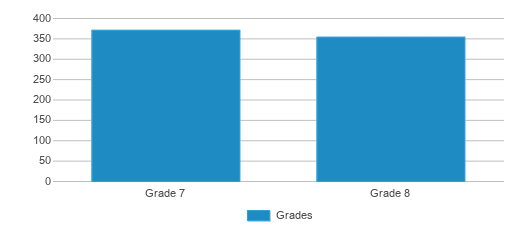
School Rankings
Prescott Junior High School ranks within the bottom 50% of all 9,602 schools in California (based off of combined math and reading proficiency testing data).
The diversity score of Prescott Junior High School is 0.61, which is less than the diversity score at state average of 0.63. The school's diversity has stayed relatively flat over five school years.
Overall Testing Rank
#5411 out of 9602 schools
(Bottom 50%)
(Bottom 50%)
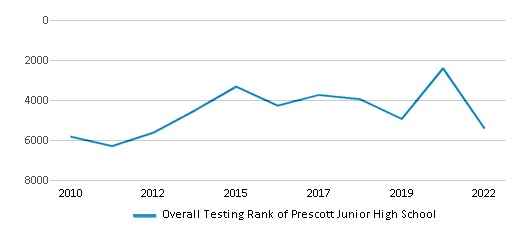
Math Test Scores (% Proficient)
23%
33%
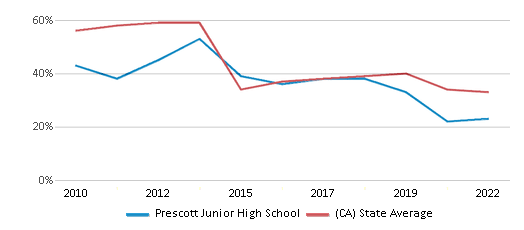
Reading/Language Arts Test Scores (% Proficient)
39%
47%
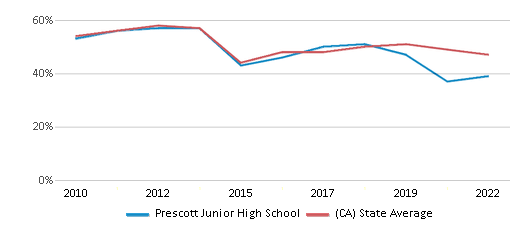
Science Test Scores (% Proficient)
26%
29%
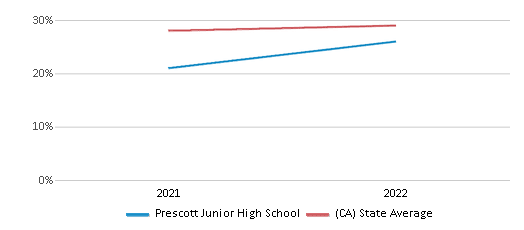
Student : Teacher Ratio
19:1
21:1
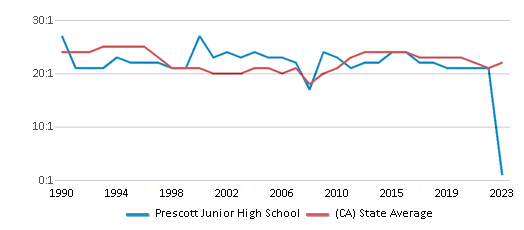
American Indian
1%
1%
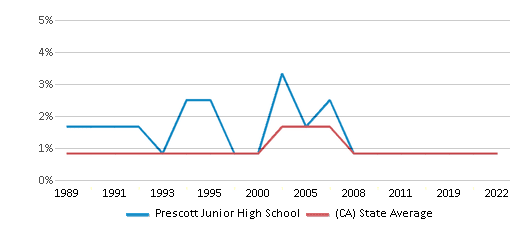
Asian
11%
12%
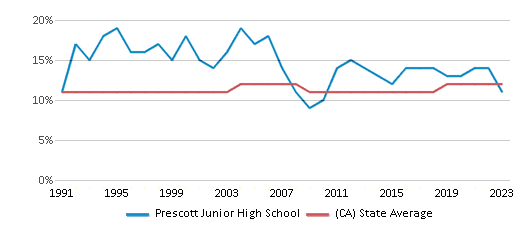
Hispanic
59%
56%
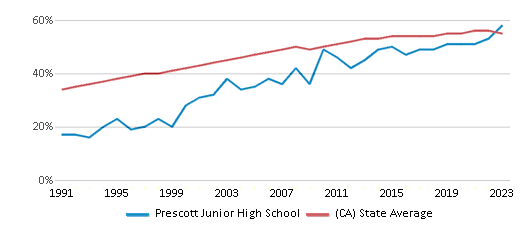
Black
3%
5%
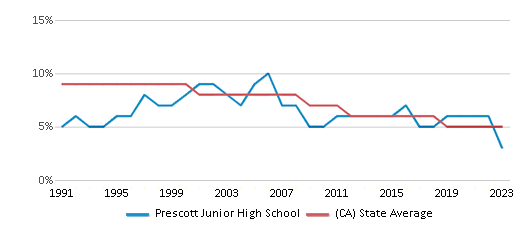
White
16%
20%
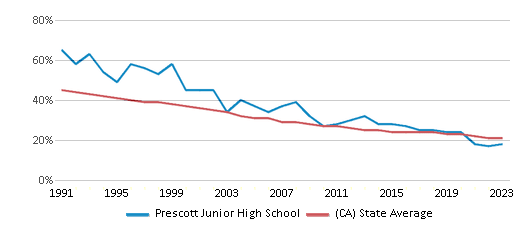
Hawaiian
1%
n/a
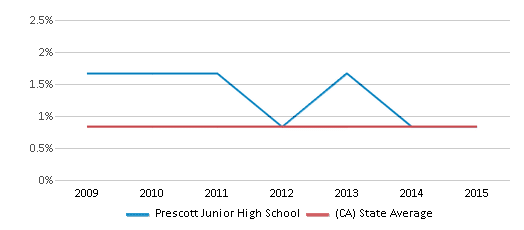
Two or more races
9%
6%
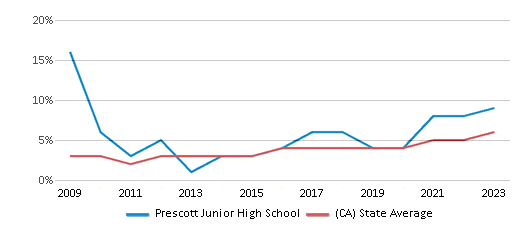
All Ethnic Groups
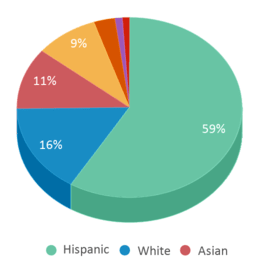
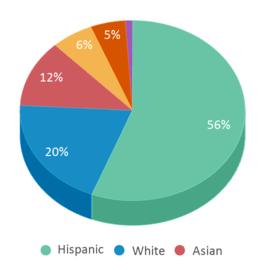
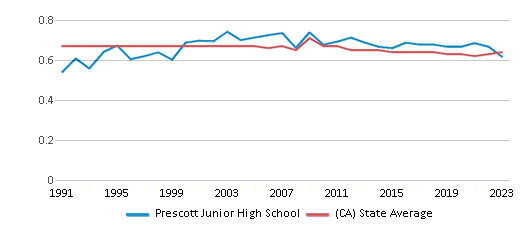
Eligible for Free Lunch
59%
54%
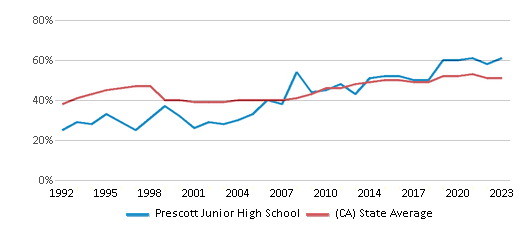
Eligible for Reduced Lunch
12%
8%
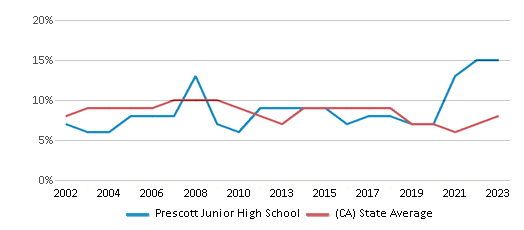
School Statewide Testing
School District Name
Source: National Center for Education Statistics (NCES), CA Dept. of Education
Profile last updated: 02/09/2025
Frequently Asked Questions
What is Prescott Junior High School's ranking?
Prescott Junior High School is ranked #5411 out of 9,602 schools, which ranks it among the bottom 50% of public schools in California.
What percent of students have achieved state testing proficiency in math and reading?
23% of students have achieved math proficiency (compared to the 33% CA state average), while 39% of students have achieved reading proficiency (compared to the 47% CA state average).
How many students attend Prescott Junior High School?
725 students attend Prescott Junior High School.
What is the racial composition of the student body?
59% of Prescott Junior High School students are Hispanic, 16% of students are White, 11% of students are Asian, 9% of students are Two or more races, 3% of students are Black, 1% of students are American Indian, and 1% of students are Hawaiian.
What is the student:teacher ratio of Prescott Junior High School?
Prescott Junior High School has a student ration of 19:1, which is lower than the California state average of 21:1.
What grades does Prescott Junior High School offer ?
Prescott Junior High School offers enrollment in grades 7-8
What school district is Prescott Junior High School part of?
Prescott Junior High School is part of Stanislaus Union Elementary School District.
School Reviews
4 1/6/2020
this school is bad.
5 7/1/2007
This school is a very good.It has an outstanding physical education program that helps kids get in shape. There are alot of sports such as track, basketball, soccer, volleyball, football, etc. The extracurricular activities such as drama, music, art, etc. are really great for the kids. They have programs for failing students and students whose grades are not exceeding very well. The teachers are friendly and helpful. This school is a school I'd recommend to everyone.
5 7/1/2007
I love this school. Everybody should have the chance to come here. There are so many academic and sporty clubs after school. There are sports for both boys and girls like track and football sometimes wrestling! If you do very well, you can get academic and athletic block P's to hold on to and to be proud of. There are great varieties of musical intruments to play such as the violin to the oboe. the art program is very good, you get to show off your handiwork! There is parents club and dances that parent, but mostly kids can go to. the teachers are great and help us whenever we need it. They rock! There is also the big mud pit. Its a huge pit of mud and parents, kids, and some teachers go ... i told you too much. Try it yourselves. Lastly, For the atheletic ones it is called Pride Week. You run 3 miles on Monday, 2 on Tuesday, 1.5 on Wednesday, 1 on Thursday and rest on Friday. It is fun! Please come to Prescott.
Review Prescott Junior High School. Reviews should be a few sentences in length. Please include any comments on:
- Quality of academic programs, teachers, and facilities
- Availability of music, art, sports and other extracurricular activities
Recent Articles

What Is A Charter School?
Explore the world of charter schools in this comprehensive guide. Learn about their history, how they operate, and the pros and cons of this educational innovation. Discover key facts about charter schools, including admission policies, demographics, and funding, as well as what to look for when considering a charter school for your child.

10 Reasons Why High School Sports Benefit Students
Discover the 10 compelling reasons why high school sports are beneficial for students. This comprehensive article explores how athletics enhance academic performance, foster personal growth, and develop crucial life skills. From improved fitness and time management to leadership development and community representation, learn why participating in high school sports can be a game-changer for students' overall success and well-being.

February 05, 2025
Understanding the U.S. Department of Education: Structure, Impact, and EvolutionWe explore how the Department of Education shapes American education, from its cabinet-level leadership to its impact on millions of students, written for general audiences seeking clarity on this vital institution.








